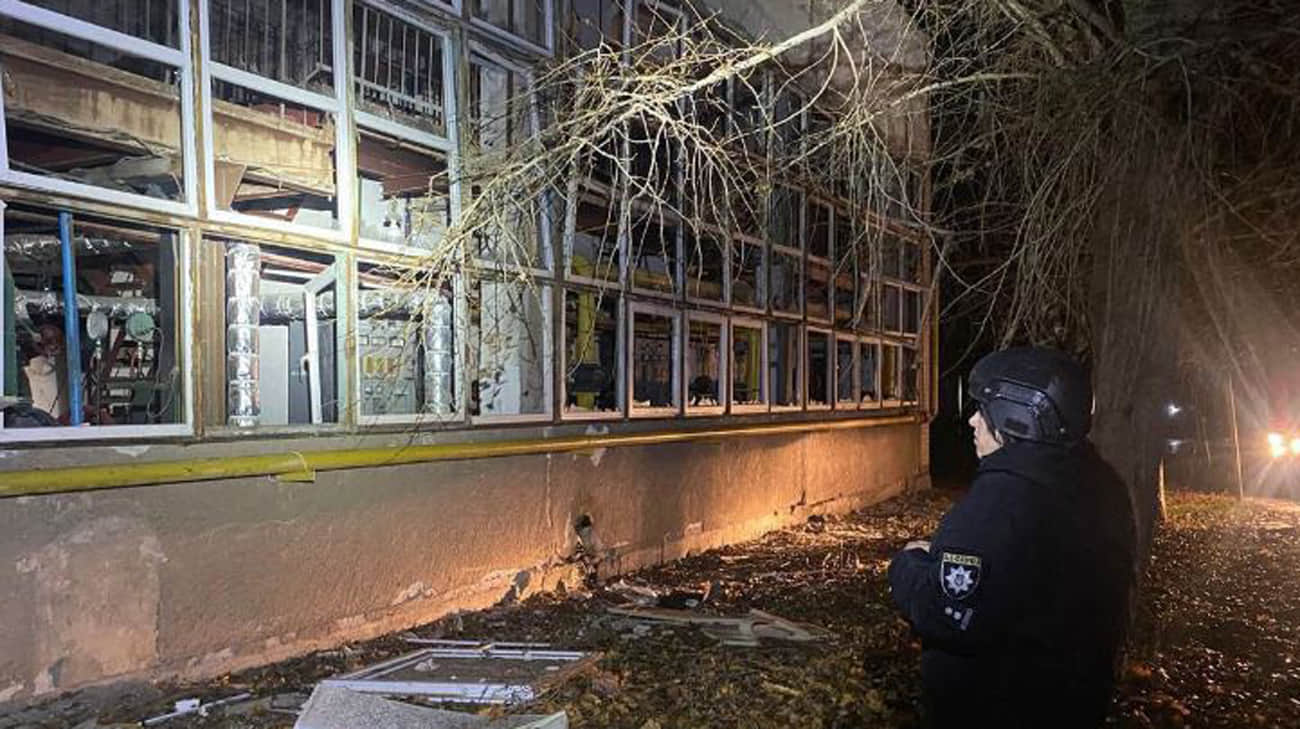VSquare: Russian spies still roam free in Brussels
Kirill Logvinov, Russia's top diplomat to the EU, has continued wining and dining Brussels diplomats despite being identified as a Russian intelligence officer. Logvinov regularly hosts lavish dinners where he spreads anti-Ukrainian propaganda, even as Brussels looks the other way. The post VSquare: Russian spies still roam free in Brussels appeared first on Euromaidan Press.
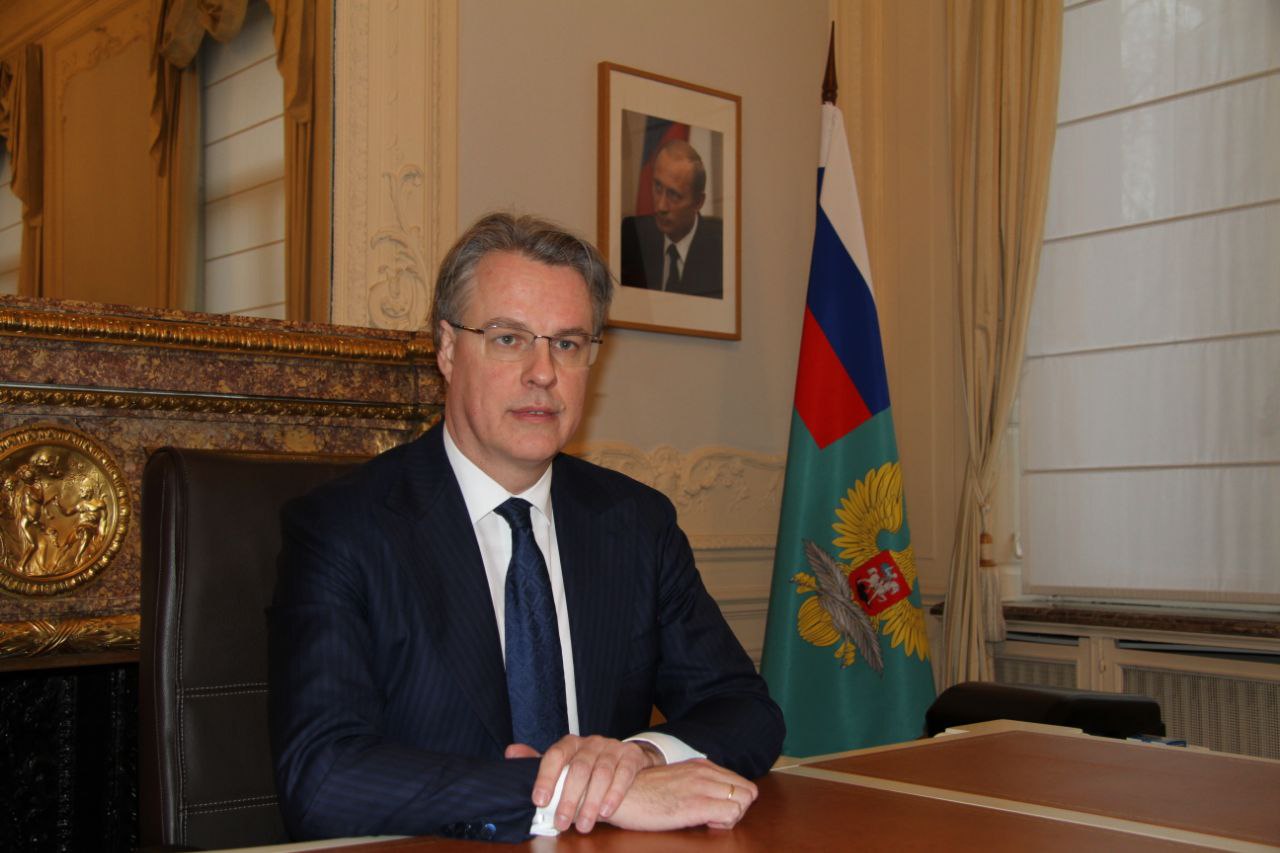
Before Russia’s invasion of Ukraine, approximately 200 Russian intelligence operatives were estimated to be active in Brussels. Despite the EU expelling numerous Russian diplomats post-invasion, a new international investigation by VSquare and partners reveals that Brussels remains a hub for Russian espionage.
Belgium’s Ministry of Foreign Affairs has refused to reveal which Russian diplomats are still working in Brussels today. Nevertheless, journalists have found out that Belgian counterintelligence suspects the head of Russia’s diplomatic mission to the EU, Kirill Logvinov, of carrying out Russian foreign intelligence functions in Brussels.
Logvinov hosts lavish dinners with diplomats from various countries, where over champagne they discuss topics like investments by sanctioned Russian companies, military collaborations, and technological partnerships against the US and its allies. Although Russian diplomats are banned from entering the European Parliament, MEPs go to the Russian mission to the EU, where they are subjected to propaganda, including anti-Ukrainian messaging. Despite this, the European Commission has so far refused to expel Logvinov or other “diplomats” suspected of espionage.
The international investigation conducted by VSquare and its partners sheds light on the persistence of espionage activities in Brussels. Euromaidan Press has summarized the report.
Russian “diplomacy” in the heart of Brussels
The Russian Permanent Mission to the EU is just 200 meters from the Belgian Prime Minister’s office, near central Brussels’s federal and regional government buildings. Acquired by the Soviets after WWII, the 42-meter-wide building on Regentlaan Boulevard was originally a trade mission before becoming Russia’s diplomatic mission to the European Community in 1988.
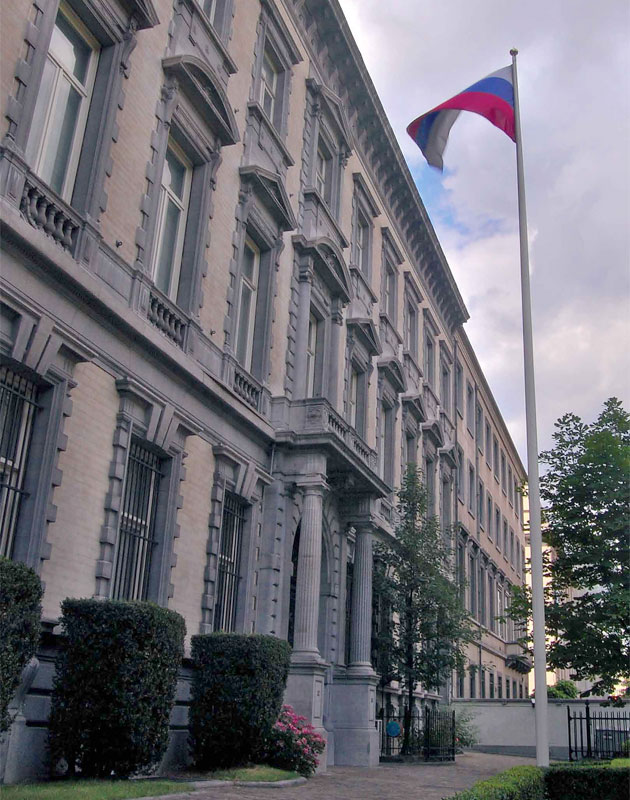
After Russia’s full-scale invasion of Ukraine, on 18 March 2022, the president of the European Parliament, Roberta Metsola, declared that Russian and Belarusian diplomats in Brussels were banned from entering the European Parliament.
“There is no place in the House of Democracy for those who want to destroy the democratic order,” Metsola said.
Since then, Russian diplomats assigned to the EU have faced significant limitations, restricting their official activities to technical matters. Moreover, two weeks later, on 5 April 2022, 19 diplomats from the Russian Mission to the EU were declared persona non grata and expelled from the country. These individuals were suspected of operating as undercover intelligence officers.
Shortly after Russia attacked Ukraine, the Belgian State Security Service (VSSE) shared intelligence with the European External Action Service (EEAS), in which they were identifying certain Russian diplomats as spies, along with details of their hostile activities. Western nations responded by expelling hundreds of Russian diplomats they believed were acting as intelligence agents.
Belgium expelled 21 Russian diplomats from the Russian Embassy on 29 March 2022, separate from the Russian Permanent Mission to the EU. However, decisions regarding permanent representation do fall under the Belgian government’s authority.
“The accreditation of diplomats at the Permanent Representation to the EU is decided by the European Commission, not the Belgian government,” explained Belgian Justice Minister Vincent Van Quickenborne on 20 October and resigned that same evening following Belgium’s failure to prevent a terrorist attack in Brussels that killed two Swedish football fans.
The EU refrained from imposing sanctions on all Russian diplomats flagged by Belgian authorities. As a result, some of them still working in the heart of the EU can carry out their clandestine espionage activities and influence. Among the implicated figures is Kirill Logvinov, the top diplomat of the Russian permanent mission, suspected to be a Russian spy.
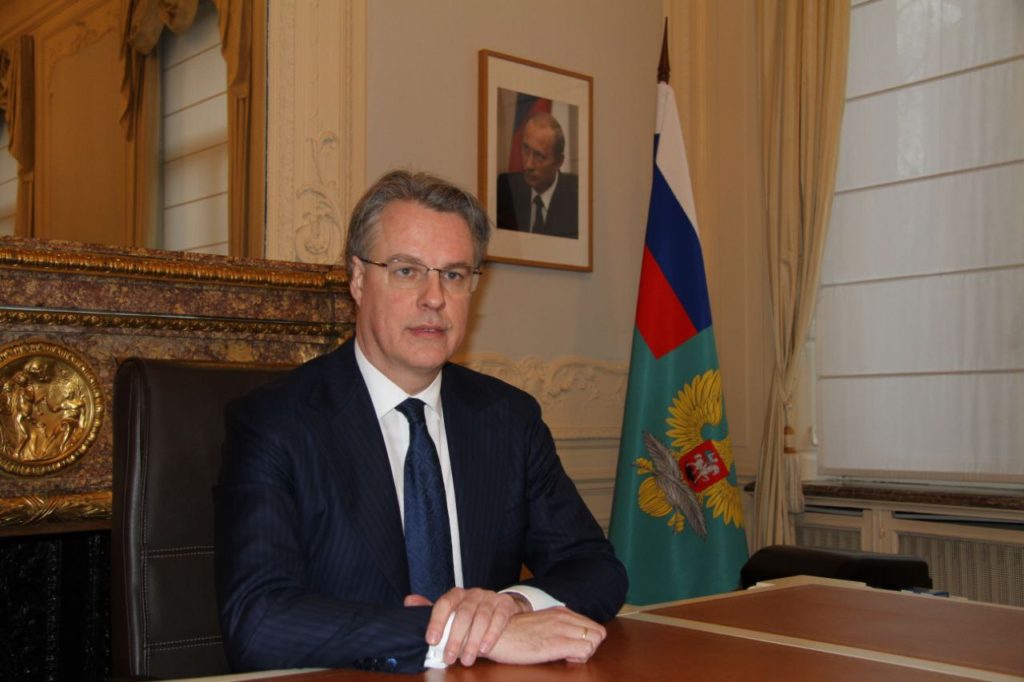
It remains unclear why the EU Commission chose to maintain Logvinov’s diplomatic accreditation. Last summer, two MEPs even requested clarification, asserting that one of Kirill Logvinov’s objectives was infiltrating the circle of Commission Vice-President Valdis Dombrovskis from Latvia.
“This was the reason why he caught our attention. Dombrovskis is also in charge of macro-financial support for Ukraine,” one of the MEPs, Petras Auštrevičius from Lithuania, told Vsquare.
During the MEPs’ wait for a response, Logvinov assumed the interim leadership of the Russian mission. EU High Representative Josep Borrell’s reply, received over two months later, was disappointingly vague and lacked substantive information.
“The European Commission has applied measures to assess the threat on a consistent basis. Detecting, deterring and responding to Russian intelligence activities has always been a high priority for the Commission,” Borell eventually replied.
Auštrevičius also mentioned hearing a rumor that the Belgians shared intelligence on Logvinov’s activities, with the European Commission opting not to take further action. Logvinov and the Russian Permanent Mission to the EU did not respond to requests for comment.
Networking with Russia’s friends in Brussels
The current head of the Russian mission, 48-year-old Kirill Logvinov, is identified as an intelligence officer with Russia’s Foreign Intelligence Service. Officials from two European intelligence agencies independently confirmed to Vsquare that Belgian counterintelligence regards Logvinov as a Russian foreign intelligence officer, but VSSE declined to comment.
Logvinov’s official resume conceals his intelligence function. Graduating from the Moscow State Institute of International Relations of the Russian MFA (MGIMO) in the 1990s, he has held various roles, including press and cultural attaché in Vienna, head of the NATO desk at the Russian Foreign Ministry, and positions at the Russian Permanent Representation in Brussels, with a stint in Berlin from 2010 to 2014. His current rotation in Brussels began in 2018.
On 27 September 2022, Logvinov became the head of Russia’s Permanent Mission to the EU, succeeding Vladimir Chizhov. Chizhov, a 68-year-old Russian politician and diplomat, led the mission for 17 years but ended up on the EU’s sanctions list for his subsequent role in the Russian Federation Council, the upper house of the Russian parliament.
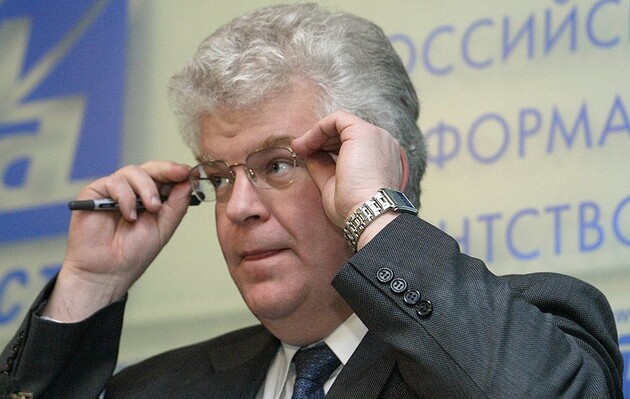
Following his appointment, Logvinov engaged in a series of one-on-one meetings with diplomats from Belarus, Kazakhstan, Syria, Lebanon, Turkmenistan, Tajikistan, Egypt, Azerbaijan, Kyrgyzstan, and Venezuela. The mission, under his leadership, expressed its commitment to strengthening ties with Russia in Brussels despite ‘the changing geopolitical landscape’.
Events with diplomats from China, Iran, Cuba, Nicaragua, Africa, Latin America, and Southeast Asia followed, covering topics such as investments by sanctioned Russian companies, military collaborations, and technological partnerships against the US and its allies.
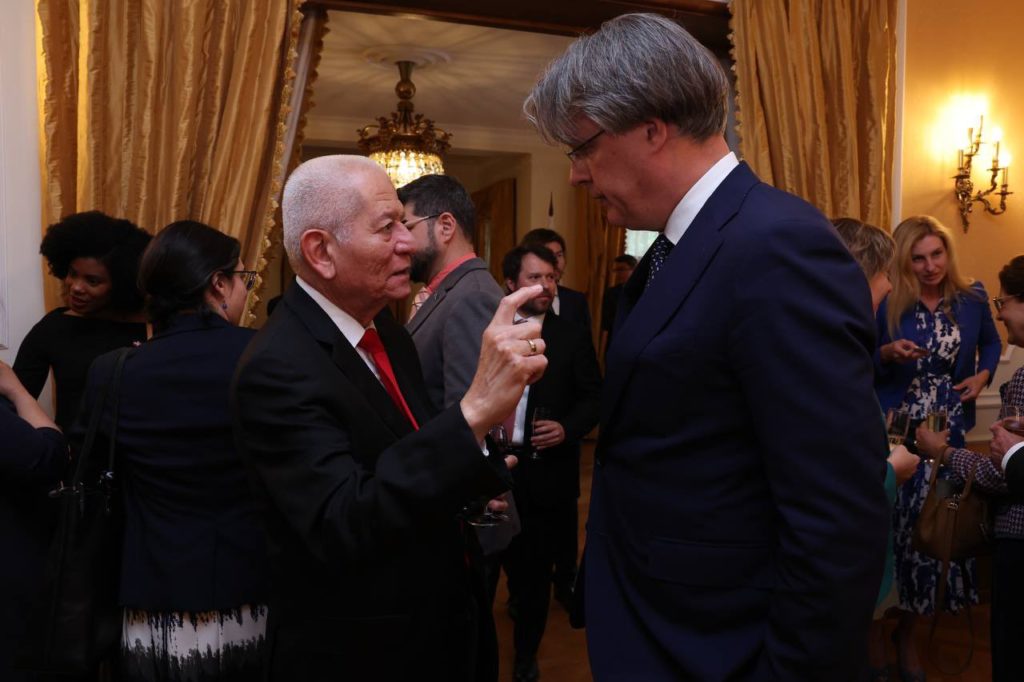
At the same time, Logvinov told a Russian news agency that there was ‘a hybrid war against Russia’ and that his country would ‘not just forget and forgive’ the EU decisions.
In September 2023, Logvinov convened a meeting with ‘the Group of Friends in Defense of the UN Charter,’ which includes China, Belarus, Russia, North Korea, and Iran.
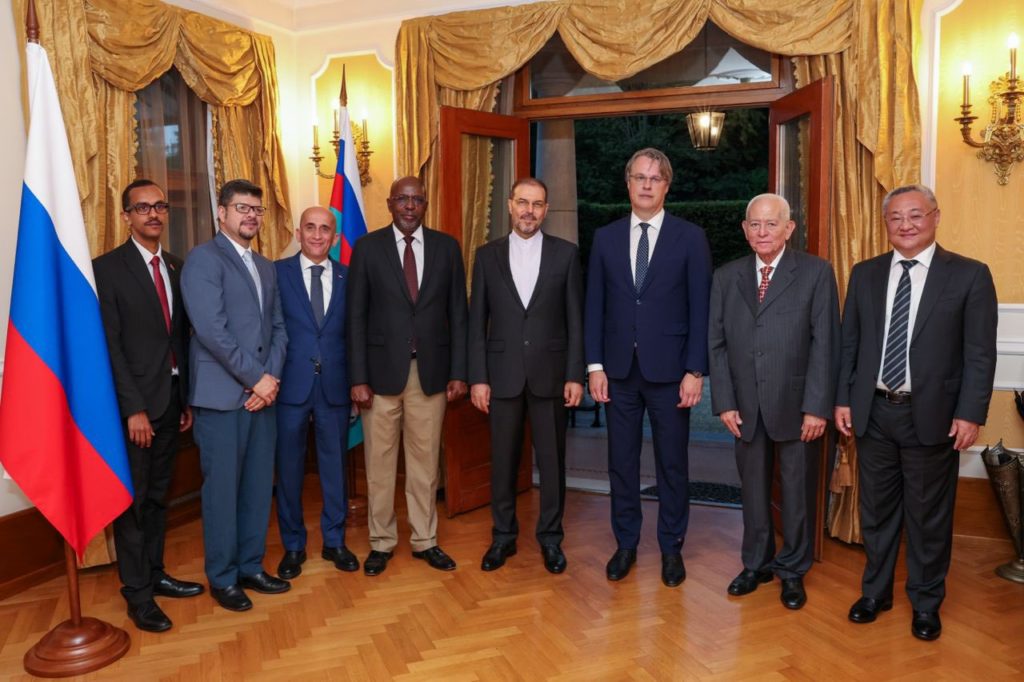
Simultaneously, the mission disseminated propaganda, including a “documentary” on organ trafficking in Ukraine titled “Tanks for Kidneys.” Notably, Russian diplomats, restricted from EU buildings, found a workaround by hosting MEPs at their own events.
In June 2023, far-right Slovak MEP Milan Uhrík, chairman of the neo-Nazi-affiliated Republika party, attended one of Logvinov’s receptions. Uhrík, praising dialogue for peace and energy opportunities, denied meeting Logvinov and dismissed media speculation about Logvinov’s alleged ties to Russian intelligence.
“I am not afraid of agents, I already have enough experience with negotiations in high politics and I am always extremely cautious when communicating with anyone,” Uhrík concluded.
Estonian MEP Urmas Paet criticized the EU’s insufficient efforts to counter Russian influence in Brussels, noting Russia’s success in influencing MEPs before it invaded Ukraine.
“In the case of the European Parliament, for example, Russia has repeatedly succeeded in getting MEPs to go on pseudo-election observation missions to Crimea and eastern Ukraine, even though this was against official EU policy,” Paet recalled.
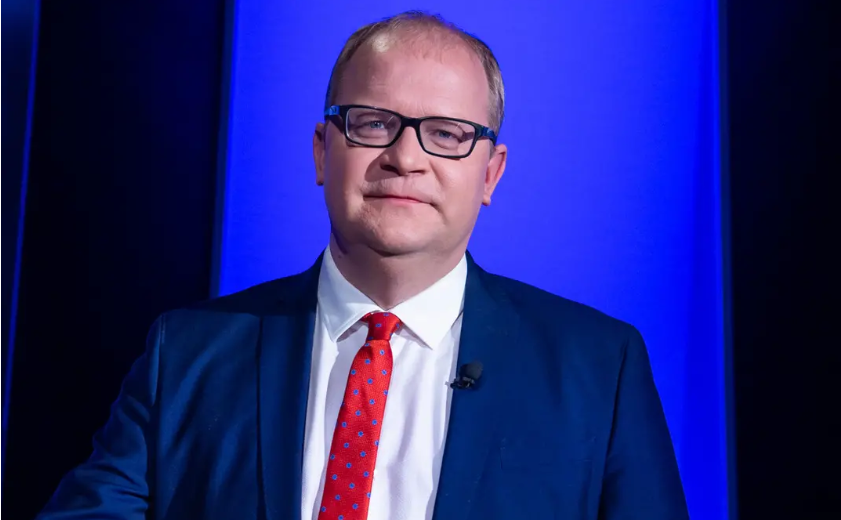
Paet also pointed out pro-Russian MEPs and amendments aiming to dilute anti-Russian legislation.
Logvinov is not the only spy left
Beyond public events, Russian diplomats engage in covert activities. Remaining Russian intelligence officers in Brussels may collaborate with Belarusian counterparts who have yet to face expulsion.
The Embassy of Belarus in Brussels reportedly harbors intelligence officers from the state security service KDB and the military intelligence service. These officers, holding “slot positions” designated for intelligence work, have actively recruited sources, monitored the Belarusian diaspora, and focused on European institutions and EU policy.
Belgium’s Ministry of Foreign Affairs has not disclosed the current Russian diplomats in Brussels. Despite a public information request, the Ministry withheld the lists of names.
However, the Vsquare investigation revealed additional undercover intelligence officers, including Logvinov, at the Russian EU Mission.
The Russian permanent mission’s website no longer lists names on the ‘diplomatic staff’ webpage after the Ukraine invasion. Using a digital archive, the Wayback Machine, Vsquare retrieved a 4 February 2022 version with 61 names, including Logvinov. While 19 diplomats were later expelled, 40 remained. The London-based Dossier Center, assisting in research, revealed that many of these diplomats have affiliations with Russian intelligence.
For example, Dmitry Vishnyakov, a 42-year-old adviser at the Russian EU Mission overseeing ‘administrative affairs,’ underwent training at the FSB academy from 1998 to 2003. This academy trains individuals to serve as FSB or other intelligence services intelligence officers.
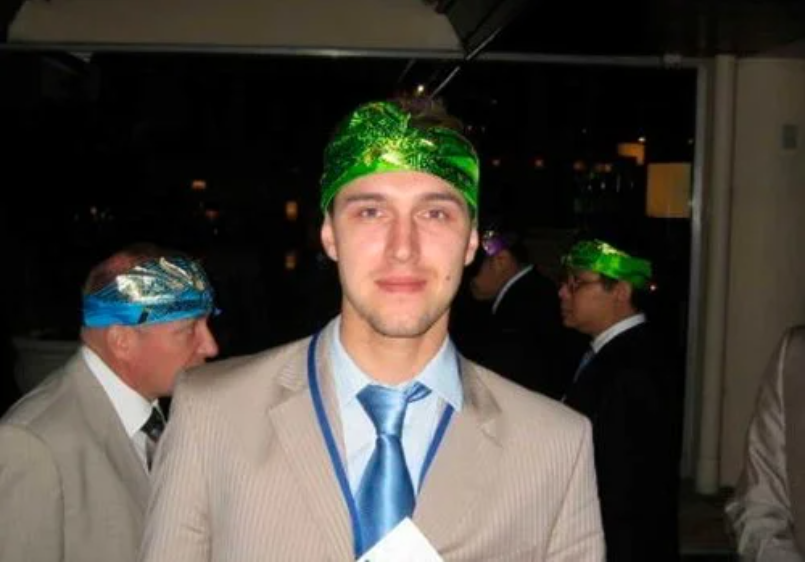
Yet another Russian diplomat, Dmitry Golovenkin, a 42-year-old second secretary overseeing commercial affairs, was registered with his family at the Moscow GRU headquarters. His father appeared to have worked in the Financial Inspection of the Russian Ministry of Defense, as indicated by social media photos.
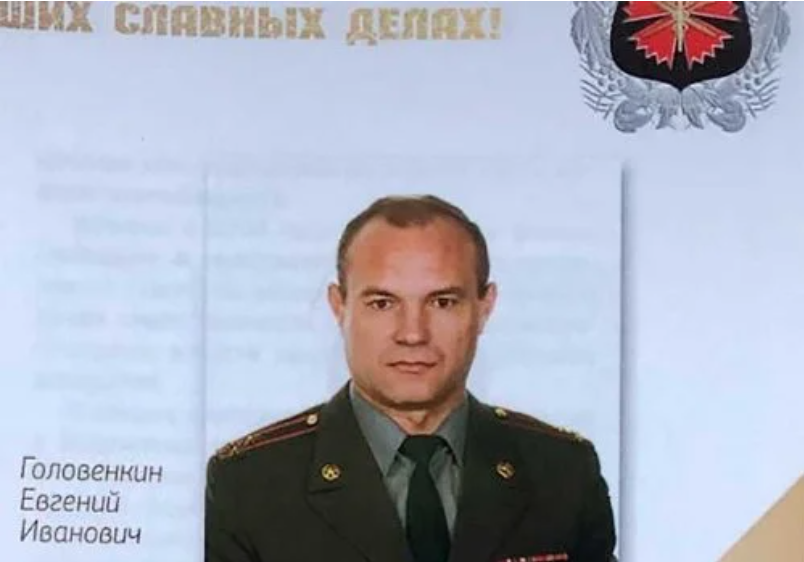
MEPs the Vsquare spoke to disclosed that there has been no outreach or training on recognizing and preventing the threats posed by Russian intelligence and influence within the European Parliament.
“To my knowledge, no training has been offered. Apart from the recommendation to remove TikTok from personal devices, there has been no specific guidance on how to protect your communications, for example, nor on how to behave in case of possible approaches by foreign intelligence officers,” Slovak MEP Martin Hojsik said.
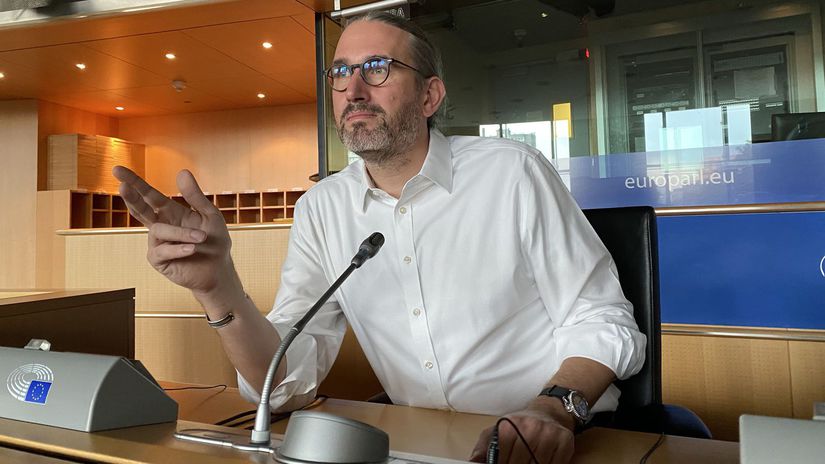
Carousel of spies
According to the Vsquare report, the Russian EU mission is a revolving door for spies, where newly arrived agents replace those with years of service. This finding aligns with the Dossier Center’s investigation, which scrutinized the backgrounds of 19 Russian diplomats expelled from the Russian Permanent Representation to the EU last year.
One notable figure among them is Arseniy Nedyak, the grandson of the former Minister of the Soviet Navy. According to the Dossier Center, Nedyak, a Russian Foreign Intelligence Service lieutenant colonel, managed pro-Kremlin outlets such as Russia Today, Sputnik, and bloggers targeting the European audience.
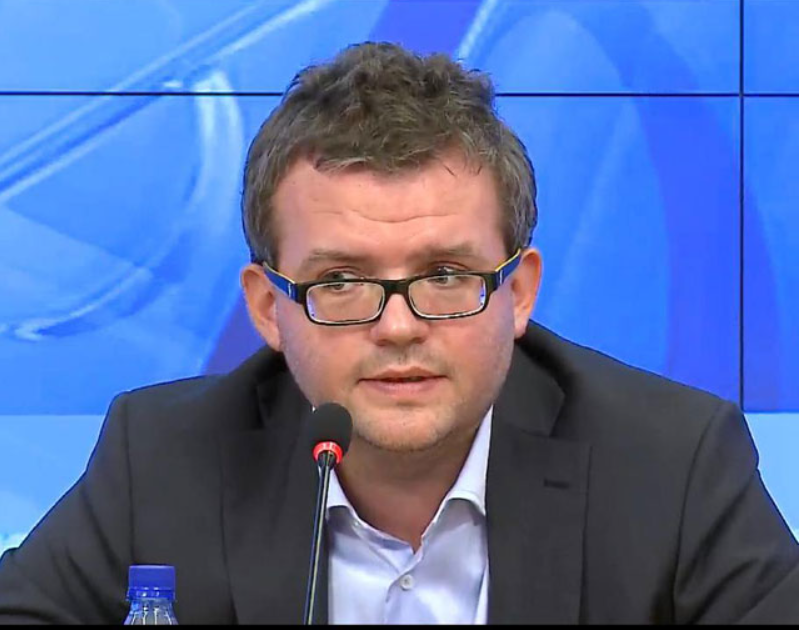
The first secretary of the representation, Sergey Zubkov, also returned to Moscow. Before his assignment in Brussels, he lived in a closed military town, Sergiev Posad-6, home to a highly classified military unit. During the Soviet era, this location housed the Institute of Virology of the Ministry of Defense, specializing in developing biological weapons. This institute, now under the Russian Ministry of Defense, continues research on dangerous infections.
Denis Shuturin, another expelled diplomat, served as the attaché of the representation. Originally from Latvia, he relocated to St. Petersburg, completing his education at the Naval Radioelectronics Institute. Later, he pursued further studies at the Military Academy of the General Staff of Russia, a training ground for future military intelligence officers. During Shuturin’s studies, his family resided in a Moscow dormitory linked to the Main Intelligence Directorate of Russia.
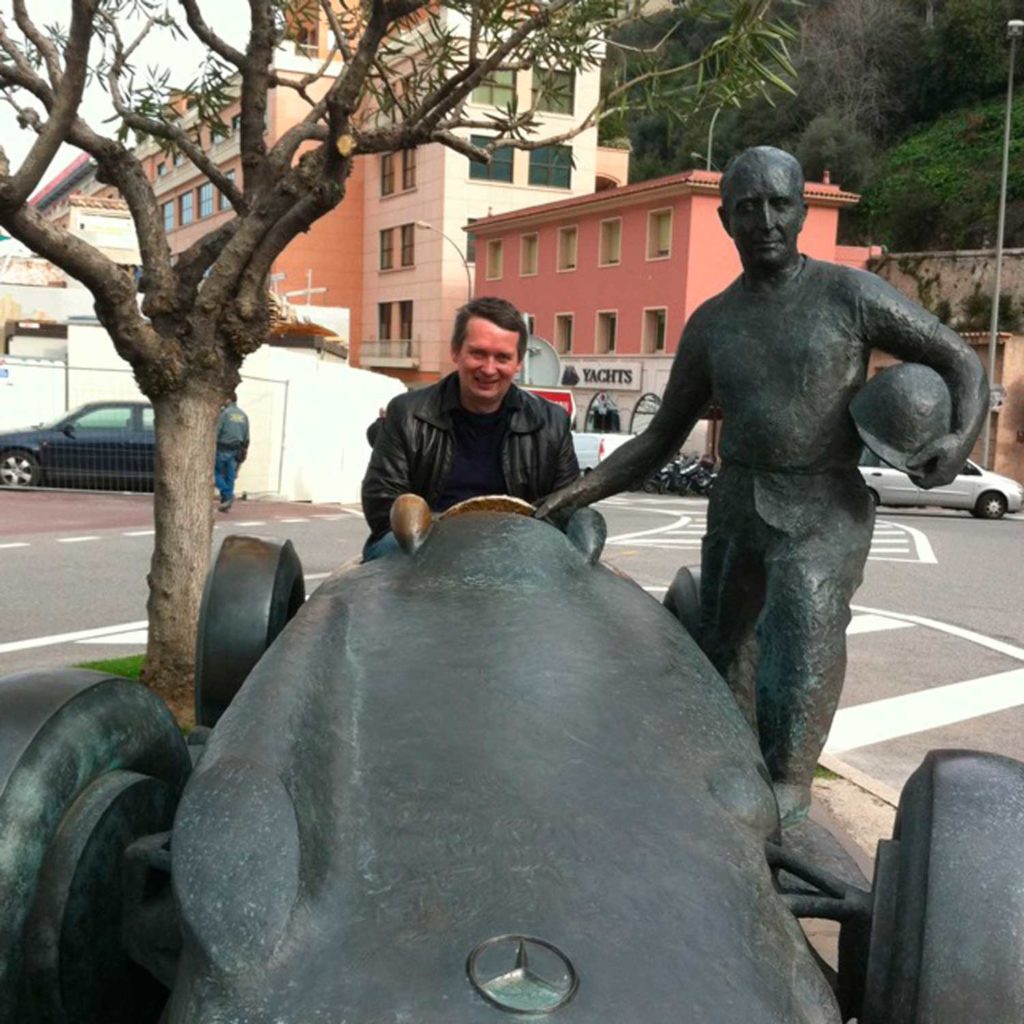
Former Hungarian counterintelligence officer Ferenc Katrein informed VSquare that the organized transfer of tasks and management of informants is a typical approach for Russian intelligence. This involves a covert “goodbye-welcome meeting” where the departing diplomat introduces the informant as their new handler officer to the incoming diplomat.
“Sometimes, these meetings take place in third countries for safety reasons,” Katrein added.
Belgian national security sources reveal that Russian mission diplomats to the EU seldom visit their official workplace on Regentlaan. Instead, they frequently go to the Russian Embassy in Uccle, the technological and operational headquarters for Russian intelligence.
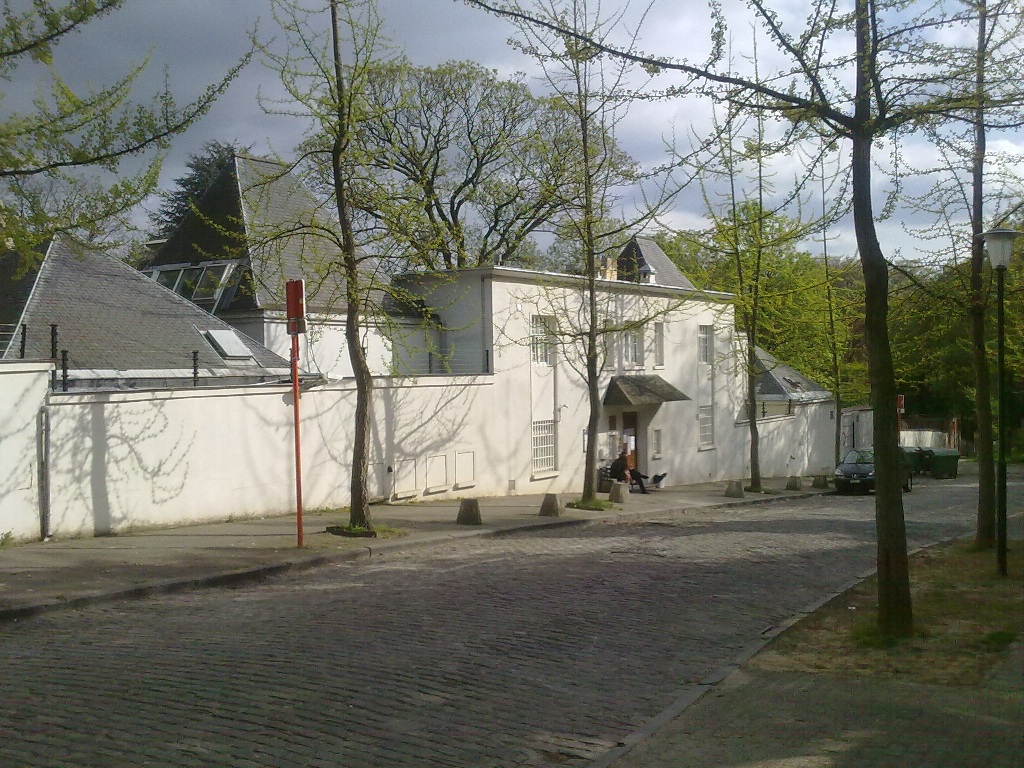
According to MEPs interviewed, the European Union and its branches have failed to prevent the Russian intelligence threat in Brussels.
“It is shocking that [Logvinov] has not yet been kicked out. If the Belgian intelligence authorities requested his expulsion, I would be very interested to know why the EEAS has not acted. I hope that, following this revelation, the European Parliament will investigate this case and demand that the EEAS act,” Slovak MEP Martin Hojsik said.
Petras Auštrevičius highlighted that the Russian diplomat is visibly active these days.
“I understand that he has been given the task of working with the Russian diaspora here in Brussels, as well as throughout Belgium. He is often mentioned as having done something,” the Lithuanian MEP added.
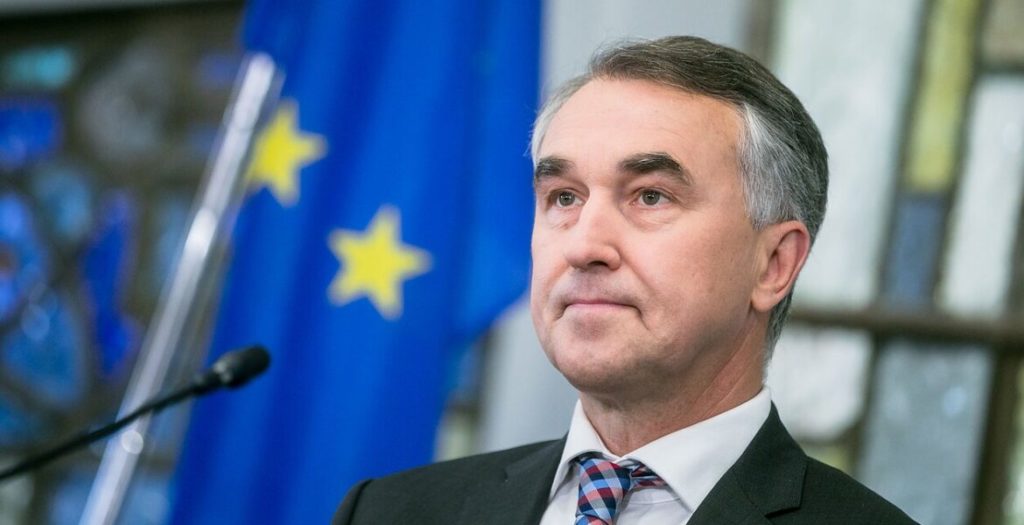
Swedish MEP Tomas Tobé calls on the Belgian authorities to conduct an investigation and deems the current situation unacceptable.
“It’s no secret that there is a lot of talk about Brussels as the ‘spy capital,’ so unfortunately, this is a reality that we have to deal with,” he added.
Read more:
- Spy hideout: where do expelled Russian diplomats resurface?
- Austria arrests Russian spy who passed classified information on war in Ukraine
- Switzerland hosts 80 of Russian 400 spies across Europe
The post VSquare: Russian spies still roam free in Brussels appeared first on Euromaidan Press.


